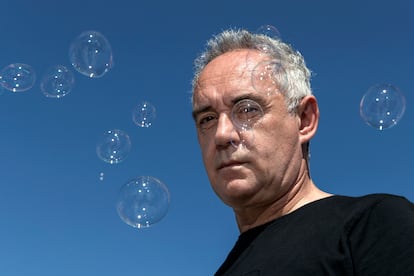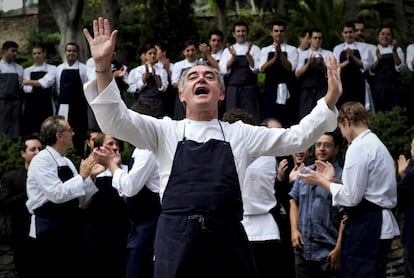Spanish chef Ferran Adrià, 10 years after closure of elBulli: ‘There’s no nostalgia’
The world-famous food revolutionary has spent the last decade immersed in teaching creativity and the science of gastronomy and now has four honorary degrees to his name


It has been 10 years since the triple Michelin-starred elBulli restaurant closed on July 30, 2011, but it feels as though it remains open due to a legacy that has extended its fame and footprint far beyond its original location in the coastal town of Roses, in Spain’s northeastern Catalonia region.
Its principal chef, the world renowned Ferran Adrià, says he still does not fully understand what happened there. This past decade has been dedicated to trying to decipher the magic through a number of innovative projects, such as his more than 20 encyclopedias. Meanwhile, he continues mentally and actively linked to the restaurant through the creativity center set up by the elBulli Foundation, displaying the same groundbreaking spirit that once revolutionized world cuisine.
“Nostalgia? None,” he says. Asked what he would do if he were to reopen, he replies, “I would do the same thing, although I still don’t really know what that entailed.” A kid from L’Hospitalet de Llobregat in Catalonia who started out as a dishwasher in a hotel in Castelldefels, Adrià managed to topple France as the universal gastronomic reference. He made a name for himself making paellas, then dismantled the world food hierarchy with a campsite restaurant in Cala Montjoi in Girona, reached via a pot-holed road where people would be encouraged to eat with their fingers.

Ten years ago, he prepared his last dinner with his mentor and renowned Basque chef Juanmari Arzak, his brother Albert and with a number of the many chefs who had worked with him in his kitchen and now had Michelin stars by the fistful, such as Massimo Bottura, René Redzepi, the Roca family and Andoni Luis Aduriz. The 50 guests started out with an aperitif – a version of Adrià's dry Martini, consisting of a reconstituted olive bubble to be placed on the tongue, allowing the gin and vermouth to evaporate. This was followed by around 50 dishes such as pistachio ravioli, liquid chicken croquettes and rose petals with ham marinated in melon juice.
After the cooking was done, the legendary chef who had been voted the best in the world 10 seasons running hung up his chef’s coat, but kept his drive and imagination alive. “Now I have another role,” he says. “Instead of creating dishes, I help to create creators.” He closed elBulli because he became convinced that he had gone as far as he could go as a chef. “We couldn’t go any further,” he says. But the creations he came up with from the time he was hired by Juli Soler in 1984, together with those of the 2,500 chefs he mentored, are still a source of wonder. Among other techniques, he pioneered the use of foam and liquid nitrogen and introduced extended menus and eating without cutlery, all of which had been unthinkable in the world of haute cuisine. “Well, I’m proud of all those things,” says Adrià. “They are techniques recognized in a number of restaurants and on the TV show Master Chef and they emerged from our experiments in elBulli.” But he considers other aspects of the experience more important. “To start with, freedom as an unbreakable rule, as an ideology, as well as challenging kids from different backgrounds to explore their own boundaries and turn what they knew upside down,” he says. “Also, the building of new bridges and new dialogues between gastronomy and other disciplines.”
Now I have another role. Instead of creating dishes, I help to create creators
Adrià lists the links that were forged then and those he believes need forging going forward. “We were pioneers in a West-East dialogue; with Japan, with science, design and art,” he says. Of the latter, he highlights his participation in the Documenta contemporary art exhibition in Kassel, Germany; it was the first time a chef was invited to share space in such an event. “I drew an important conclusion from that experience,” he says. “It is clear to me that we chefs are creatives and not artists. But that doesn’t mean that as a creative type I can’t establish an exciting exchange with an artist and see where we can go together.”
One destination for Adrià has been Harvard University with a course he has been teaching since 2010. He has also been the recipient of four honorary degrees awarded by universities in Aberdeen, Barcelona, Valencia and Montreal.
Another achievement has been the creation of dozens of bullipedias filled with a cocktail of knowledge that combines gastronomy with other disciplines. And now with the coronavirus pandemic, Adrià is once again taking a fresh look at the culinary landscape. “It is not normal that 50% of restaurants close after five years,” he says. “Along with creativity, product and technique, it needs to be stressed that we must also learn about numbers, because this is a business.”
Having said that, he is pleased with his own trajectory. “I wouldn’t trade what I’ve learned over the years for anything,” he says. “When we closed, my colleagues, partners and I believed that in two years we would understand what we had done at elBulli. We’ve been at it for 10 years and we’re still figuring it out; from why a small company became a reference at business schools to how Juli Soler changed the role of head waiter forever.”
Attempts to address these questions have been made in various exhibitions that have dealt with the elBulli experience and also in a documentary that Movistar+ will release in September, called Las huellas de elBulli (or The footprint of elBulli). In 2023, the original premises in Cala Montjoi will reopen and showcase everything regarding the exploration and evolution of what Adrià discovered in the kitchen; knowledge that has elevated this dishwasher to iconic status in the world of culinary science and creation.
English version by Heather Galloway.
Tu suscripción se está usando en otro dispositivo
¿Quieres añadir otro usuario a tu suscripción?
Si continúas leyendo en este dispositivo, no se podrá leer en el otro.
FlechaTu suscripción se está usando en otro dispositivo y solo puedes acceder a EL PAÍS desde un dispositivo a la vez.
Si quieres compartir tu cuenta, cambia tu suscripción a la modalidad Premium, así podrás añadir otro usuario. Cada uno accederá con su propia cuenta de email, lo que os permitirá personalizar vuestra experiencia en EL PAÍS.
¿Tienes una suscripción de empresa? Accede aquí para contratar más cuentas.
En el caso de no saber quién está usando tu cuenta, te recomendamos cambiar tu contraseña aquí.
Si decides continuar compartiendo tu cuenta, este mensaje se mostrará en tu dispositivo y en el de la otra persona que está usando tu cuenta de forma indefinida, afectando a tu experiencia de lectura. Puedes consultar aquí los términos y condiciones de la suscripción digital.








































